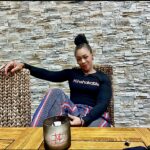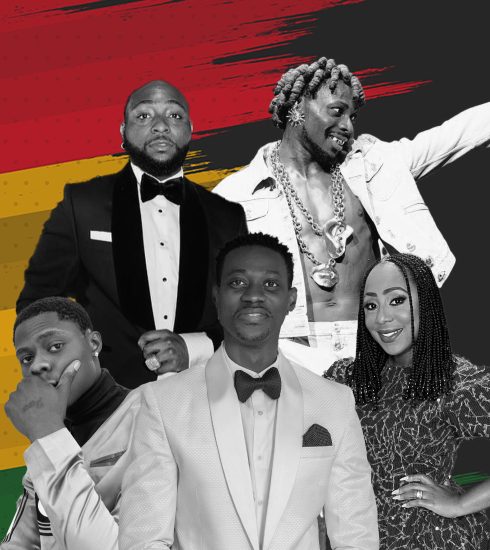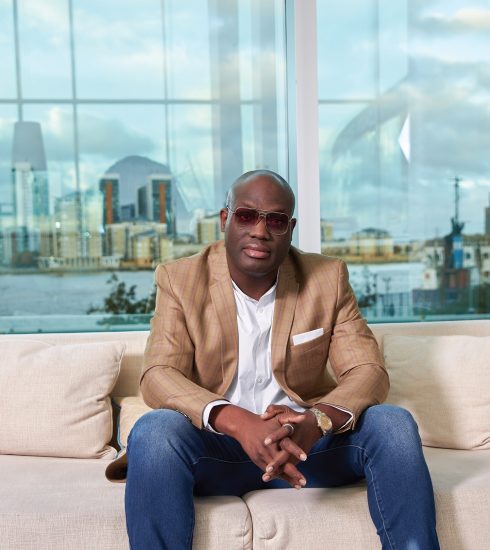Bucci Franklin: Bold, Brilliant, Becoming
Nollywood has come a long way from what it used to be. The stories are deeper, the acting is stronger, and the production quality keeps improving. With streaming platforms opening new doors and creatives constantly pushing the limits, the Nigerian movie industry is now one of the most exciting in the world. This growth didn’t just happen overnight; it’s the result of years of hard work, consistency, and the passion of individuals who believe in telling authentic African stories. These passionate creatives have kept the fire burning and are helping to shape a better future for Nollywood.
One such creative is Bucci Franklin, an actor, TV host, presenter, and storyteller whose talent continues to shine across screens big and small. After studying Theatre Arts at the University of Abuja, Bucci began his career as a presenter before finding his place in Nollywood. From early projects like Knockout Blessing to his breakout role as Nze in Rattlesnake: The Ahanna Story and his powerful performance in Netflix’s Far From Home, Bucci has proven himself time and again. Beyond acting, he’s expanding his craft; he’s set to direct and star in his first feature film next year, and he has some mind-blowing projects in the works. He’s also writing a book titled Sound of Acting, which is not just for beginners but for actors at all levels. It’s a guide based on real experiences, lessons, and practical truths from his journey. For Bucci, it’s not just about fame, it’s about impact, and he’s already laying the foundation for the legacy he wants to leave behind.
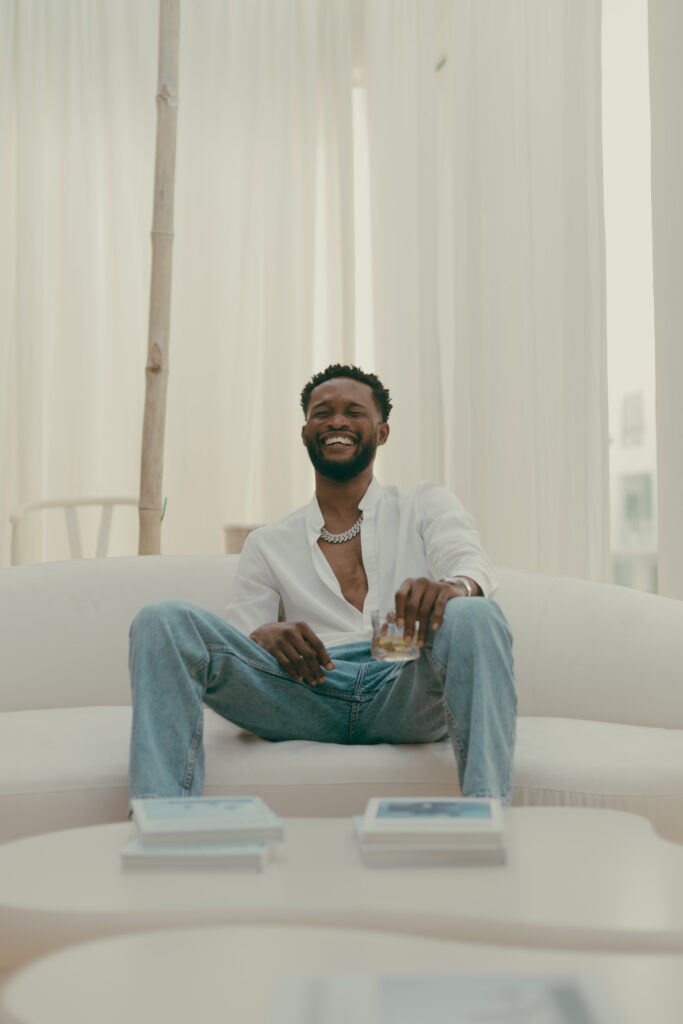
In this interview with THEWILL DOWNTOWN’s Dorcas Akintoye, Bucci Franklin discusses his journey so far, how he grew from hosting shows to starring in major films, the future of Nollywood, what keeps him grounded, and the powerful message he hopes to share through his work both on screen and in writing.
Your journey started in media as a presenter before you transitioned into acting. What was that turning point when you knew Nollywood was where you truly belonged?
To be honest, I had always known that this was it for me. I do believe in reincarnation. And I see this as a journey that I have experienced before. But we needed to do other things to gather and garner experience because that’s what being an extraordinary performer is about. Allowing yourself to experience life, creating moments that you are in control of and sometimes not in control of, which is life, basically.
What would you say were some of the silent battles you faced behind the scenes before you got your first big acting break?
You’re taking me back to memory lane. Like every other industry, there are hurdles in life. And the only time you get to your final destination is when our Heavenly Father says your time is up. So, I’d say that what you see, what you call battles, what other people see as obstacles and scars, I see them as moments and experiences to be grateful for. And yes, some of them were a bit emotional, but I thank God for the grace to keep going. I moved to Lagos because I had to move to be closer to the industry. So, I’d say that it was a bit of a challenge, but an exciting one. And living in Lagos, having to move from one apartment to another, just having to take anything that comes my way, until I got a break with AY. I did a sitcom in 2011-2012. We did a sitcom. It’s called AY’s Crib. That’s how I got into the Nigerian movie industry here in Lagos. We did the first season where we had the likes of D Banj, KCee, and Limpopo back then. As a matter of fact, it was I, AY, Ushbebe, Alex Ekubo, and Venita Akpofure. So, at the time, there was nothing like that. It was AY’s initiative. A bunch of his friends living with him in his house. It was a good way to start, really. And after that, I had to (because I was on dreadlocks then), so I had to take off my dreads so that I could do multiple characters. I did a film with a director in Enugu. I think that was my first feature in Lagos. It was I, Daniel K. Daniel, I think he’s moved to the States now, Belinda Effah. She’s changed her surname now. She’s also moved to the States. It was the three of us who did that film, and Ebele Okaro. So, yeah, that’s pretty much it. Honestly, I could go on and on, because it’s been an amazing journey. I’ve been doing this for over a decade, so I don’t think I can sum up my experience on my challenges and the beautiful scars that I have amassed while working.
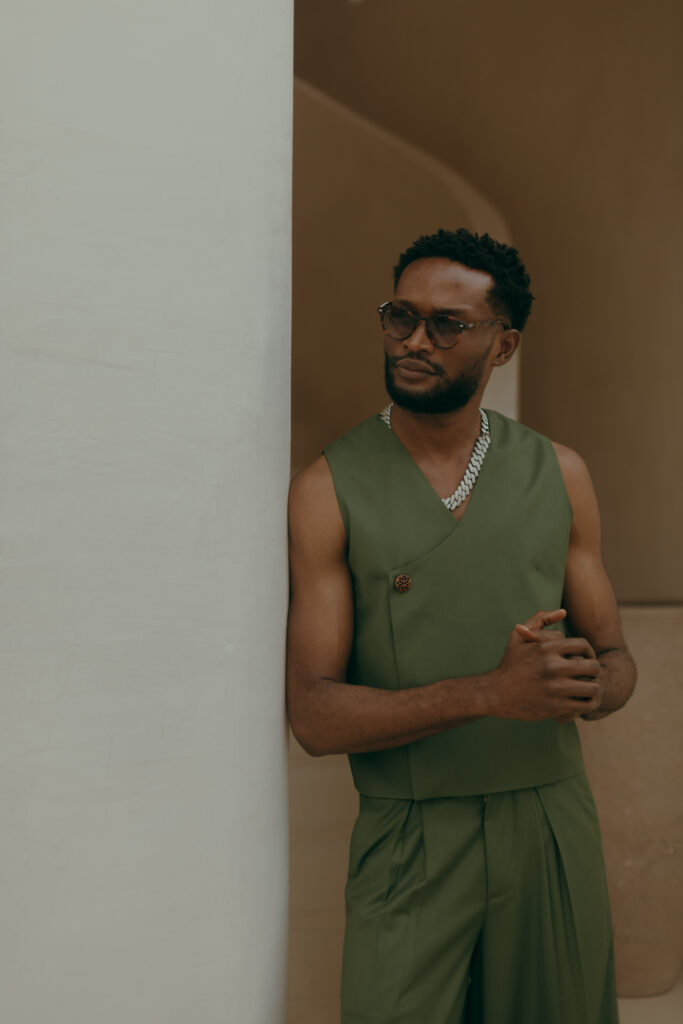
You studied Theatre Arts at the University of Abuja. How much of what you learned academically still shows up in your work today?
I did a project in Port Harcourt about a month ago, and I had the privilege of working with Sam Dede. Sam Dede is a theatre arts lecturer at Uniport. We were talking, and I’ve always had this idea, this notion. It’s been like a buzzer to me. Why we’ve chosen to peg upcoming actors, upcoming theatre practitioners with the Western theatre culture. Why are we not celebrating the African theatre culture in our studies, in our curriculum? We got talking, because the first year they teach you Shakespeare, you’re doing Shakespearean stories, you’re basically just doing research on Western culture, as opposed to our indigenous writers that are celebrated globally. You know, the Lichi Amadis, the… Oh my God, I can’t remember some of them now. There is Elechi Amadi, there’s Wole Soyinka, there’s Ola Rotimi. You know, these are writers that I feel like, you know. I feel like what we’re being taught in school as theatre practitioners isn’t what should be in the curriculum. If I were given the opportunity, I would want to write a bill, and I’m sure I’m speaking the mind of Uncle Sam, because we were having a conversation, and he was also just shedding light and complaining bitterly about it. So, I watched a video of Viola Davis talking about how she was taught how to act, that she was taught how to act like a white woman, not a black woman. You know, so is education good? Yes, it is. But we need to conscientise our people. Yes, Hollywood has done a lot for the world, but I think it’s time for us to emulate the Indians, Bollywood. The stories they tell are authentic. They talk about their history. They don’t go as far as emulating what Hollywood is doing, and even when they decide to do that, they do a fantastic job at that. All I’m saying is, if we are teaching Nigerian children who want to go into filmmaking in universities all around the country, let us celebrate. Let us be thorough. Let us remove that mentality of introducing them to the Western form of art because there’s a lot that we can tap from here, not just as Nigerians but as Africans. So, I always say thank you to Professor Ojo Bakare. He was one of my lecturers, and that’s one man that I can never forget, because I remember playing my first play in school. It was a play that he did, This Man Called Joe. I think Obasanjo was the president at the time, and it was supposed to be like a satire. It was a satire. I think my character was somewhat of a parody. So he came up with it. He wrote the play, and we were privileged to play it out on stage. So Professor Ojo Bakare was somebody who introduced me to understanding and honing my craft as an actor, and just becoming and falling deeply in love with what I know how to do best.
You’ve been part of Nollywood’s new wave of actors pushing the industry forward. What do you think is Nollywood’s greatest strength right now?
Well, honestly, I can’t speak for Nollywood. It’s an industry of different sects and departments. Everybody’s doing what they can to push out great content, from YouTube to different streaming platforms, to cinema. I feel like collaboration has become an essential tool in filmmaking in the Nigerian movie industry. So there are lots of collaborations between production companies, between producers and actors, and between actors. I’ve got a few projects that I’m doing that are produced by actors. And they’re like, oh, but we can’t afford your fee. Do I need the money? Yes. But when I look at the script, and also whoever it is that I’m speaking to, I see the passion behind what you want to do. So, of course, I’m going to discuss with my management and tell them what I want. And it’s left for them to say, okay, this is viable or not. So, I feel like collaboration is our strength right now. Also, with the advent of Netflix and Amazon leaving the country, all of that has brought us together under the same umbrella. When the elephant is no longer in the room, we can all see ourselves. So it’s pushed us closer. And because of all the conversations I’ve been having, I’ll speak for myself. Like I said, I’m not going to be speaking for an industry that has over 3,000 to 4,000 people actively creating content and film. So, I speak for myself. There have been more collaborations in the past three or four months. Yeah. That’s what I would say is our strength now.
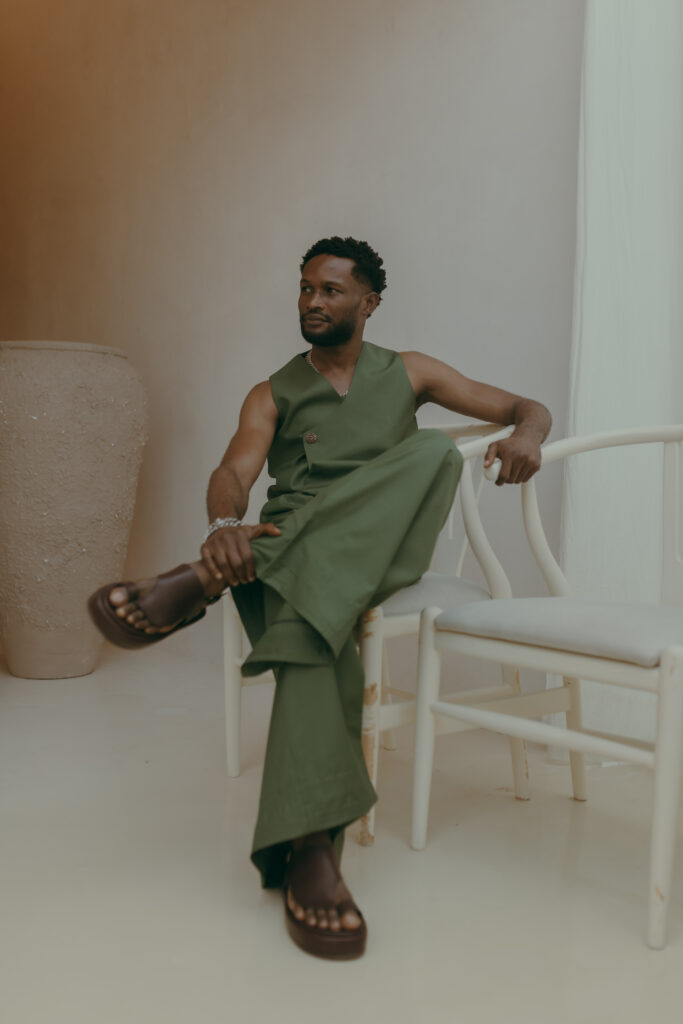
In your opinion, what’s still missing or lacking in Nigeria’s movie industry that needs urgent attention?
If I’m being honest, funding. Access to funds. There are a lot of great stories, intelligent filmmakers, and budding filmmakers in the industry. And they have beautiful stories. However, the epileptic flow of funds is a major problem. And I feel like if that can be tackled, conversations like workshops can also come up for every department in the industry. Not just for actors but for producers, for example, costume and lighting. I feel like there needs to be a workshop for every department. We’re doing extraordinary things. Two Nigerian films made it to Cannes this year. I think more than one. I can’t remember the name, made it to Cannes this year. Some Nigerian films are going to be picked for Sundance. I don’t know. I’m not certain. But I know next year a lot of Nigerian films are going to big festivals. So, we’re pushing our content on a global scale. I just can’t wait for the film that I’m a part of, the film that I’m starring in, the film that I’m leading on to get nominated by our brothers and sisters in the diaspora. That has to be my vision. My vision is to get my Oscar. My vision is to get my BAFTA. Not just so that I can shelf, but to put Nigeria on the map, to create the consciousness in every actor in Nigeria that if I can do it, you can. If I’m being honest, there are a lot of great actors in Nigeria. There are fantastic directors in Nigeria. And I’m not saying this because I’m friends with anybody. I see talented people day in and day out, and it’s just mind-blowing. I can’t wait for the world to experience what we have to offer. There’s a series on Netflix called The Party, and it was brilliantly shot by Yemi Morafa. I did a project with Kemi Adetiba. It’s called To Kill A Monkey. It’s coming out sometime next month, I hope, and Kemi shot the sh*t out of that series. Excuse my French, but I don’t know what other word to use. She is a genius. In 2023, I did a project with Bolale Austin-Peters. It’s called Wire Wire. I don’t know. I think there’s something about women in film. And if you ask me, I’d love to work with Nigerian female directors because they just have an eye for excellence. Working with Bolale Austin-Peters was beautiful. I forgot at some point that I was working because it just came, it was natural. And that’s what acting is. If it’s not natural, then it’s being forced. And Bolanle allows the actor to breathe. So, I can’t wait for the world to experience Wire Wire. That’s her project that I starred in. I played Lee. I did a film with a Nigerian-British director and writer. It’s called Lady. It’s got an amazing female lead cast. I don’t want to say too much about it because it’s a British film. It’s not out. It’s a festival piece. It’s going to put some Nigerian actors on the map. I was a part of that. That’s a big film. I can’t wait for the world to experience Lady. I think we did that one last year. So, there are a lot of beautiful projects coming out that I can’t wait for the world to experience.
There’s a growing presence of Nigerian content on global platforms like Netflix. How do you think this shift is changing the industry and actor expectations?
If you had asked me this question 10 years ago, I probably would have given you what I see as an ignorant answer. But with my experience in filmmaking now, I understand that quality over quantity, quantity over quality, is just somebody somewhere not having too much to do with their time and just spewing words. As long as you’ve got a camera up and you’ve got actors in front of you, and you’re passionate about what you’re doing in this line of work, I’d doff my hat. I look forward to working with you. Because if you’re discussing quality over quantity, I mean, look at Bollywood. They’re a great example when it comes to quality over quantity. They keep churning out movies regardless of what the world says. Filmmaking isn’t a walk in the park. So, quality over quantity, that’s not a thing, as long as you’ve got cameras up, you’ve got a lighting crew, you’ve got your story straight, and you’re entertaining people. Because you remember this Odugwu Paranran, right? So it’s a YouTube film. And I see how YouTube productions are being perceived; some people think, oh, it’s substandard. There’s always an error, yada, yada, yada. But look at what that film did for the actors. Uzor Arukwe has been in the industry for a bit, and he’s been making the rounds. But look at what a YouTube film did for Uzor Arukwe. I was in Port Harcourt filming, and I saw Uzor Arukwe’s picture on the billboard (because I’m a Port Harcourt boy) alongside some Port Harcourt comedians. And under his picture, his nickname Odugwu was written, as opposed to Uzor Arukwe. You get what I mean? So it was because of the film. You know he also got an endorsement from a financial institution. It was because of that film. So, I’m not big on having conversations about quality or quantity. Are you passionate about what you’re doing? Are you telling stories? Are you entertaining your audience? That’s pretty much it. That’s why we’re in this business. We’re in this business to entertain, so that’s pretty much it for me. Wherever you find yourself as a filmmaker, if you’re in Asaba, if you’re in Kano Kannywood, if you’re in Port Harcourt filming, if you’re in Edo, and you’ve just got a 7D camera and one Kino Flo light a couple of actors and you’re just creating film, that’s all that matters. It’s not about quality and quantity. I mean, some people do big-budget films, and by the grace of God, I happen to be a part of that chain of production, but it is still the same thing, you know? It’s like using an expensive phone, and somebody has a monotonic phone beside you. When the time comes to make a call or receive calls, they’re also going to receive. Their phones are going to ring regardless of whatever make or phone it is that you’ve got; they can still make calls. I’m just trying to use that analogy to explain the question that you asked.
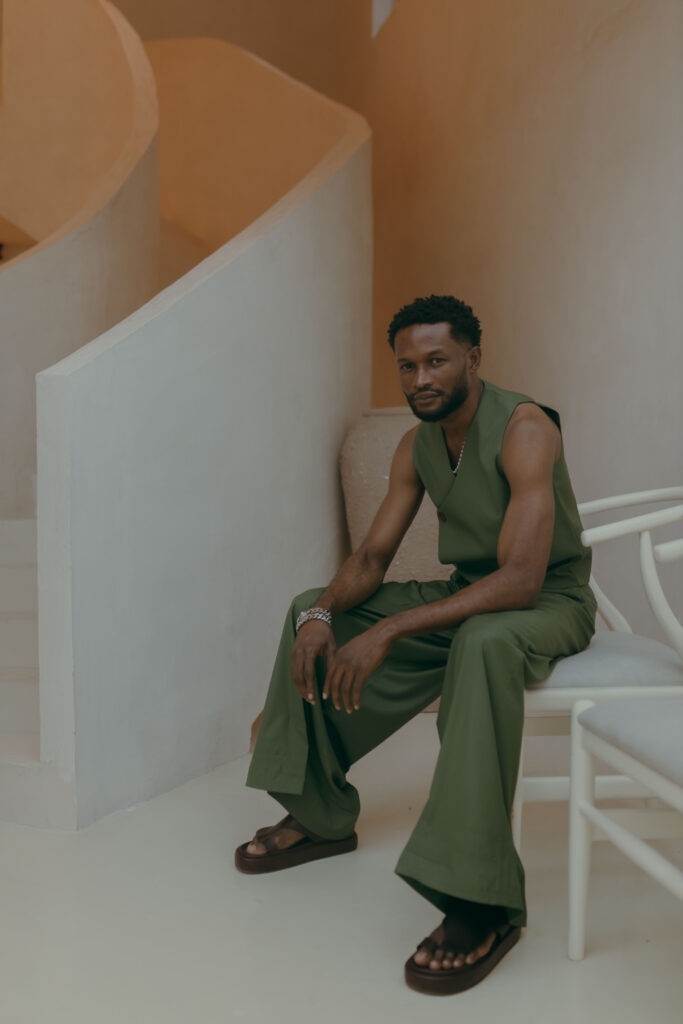
What legacy do you hope to leave behind as an actor?
I’ve started already. It has not been easy, but that’s the beauty of it all. Churning out characters that will stand the test of time. I’m working on writing a book for actors, not just beginners, but also actors in the business. It’s titled The Sound of Acting. Because acting has a sound, but you need to allow yourself to experience more than what it is that you know for you to find your sound. Because every character has a sound. So, my vision is to create a platform where actors will be seen, actors will be heard, and Nigerian actors will be put on the map. That’s why I’m in this business. I’m in this business to make my brothers and sisters look godlike because we’re performers. We’re not here for the round of applause or the standing ovation. We’re here forever.
Are you looking to explore other parts of the entertainment industry soon, like directing, producing, or even music?
I’m working on my own projects now, alongside doing independent projects for people. I’m going to be doing my own film, but I’m still working on the script. So, by next year, I should go into production. I’m going to be directing my feature next year, starring and directing it. I wouldn’t want to say the title. Let’s just wait till next year. Producing, I don’t have a choice. It’s a story that I’m working on with my partner. I’ve got a few producers, and it’s a pretty interesting story. Thankfully, I’ve got some happy investors. So yeah, we’re looking forward to principal photography next year. Directing is something that I can’t wait to do. I really can’t wait. I was saying earlier, we’ve got crazy talented actors in Nigeria. I want to give them the opportunity to shine. When I say shine, I don’t mean click beats, I don’t mean trends. I’m not talking about hit likes or photos. I want to create an opportunity for performance in storytelling. I feel like Nigerian actors are blessed. We’re seeing sights and sounds. It’s on the surface level now. The Gabriel Afolayan, The Gideon Okeke, The Seun Ajayi, the Blossom Chukwuchekwu, and Uzor Arukwe. There are a lot of actors in this country who are blessed. And this is me just calling the male actors. Also, you know, the women are ridiculous. There’s Shine Rosman, there is Bimbo Ademoye, there is Nse Ikpe Etim, Kate Henshaw, oh my God. There’s Lady Joke Silva. There are so many. We are blessed beyond understanding. It’s scary. And I can’t wait to work with these people on my project. There is Chioma Chukwuka, my Lord. These are actors whom I’m willing to go the extra mile for. There are some that I can’t remember. I saw a film that Iyabo Ojo did some months back. It’s a Yoruba film. I watched it in Abeokuta. She was a warrior in the film. She was believable. There’s a woman who played her mom in the film. The woman is the best female actress in Nigeria. I’m telling you. The whole film was in Yoruba. My Yoruba isn’t, you know, but I connected with every sound that woman made in that film. I can’t remember her name because it was my first time seeing or watching her. She was phenomenal. Ola Rotimi is phenomenal. He is a brother of mine. I did a series with him. There is also William Chino Nyenem. That guy is a stage director, a stage actor. He’s also an actor. I’ve worked with him. You’ll understand in a couple of weeks or a couple of months. He is phenomenal. So, we’re blessed with a lot of talent. I can’t wait to work with him. I can’t wait to explore the talent that he’s got on my set. I can’t wait. I hope they say yes to me when I get called in soon.
You’ve had to evolve in front of a watching audience. How do you stay grounded while navigating fame, pressure, and public expectations?
I hold on to God, my mother’s prayers. My woman keeps me grounded. My sisters keep me grounded. My friends keep me grounded. I’m a family man. I believe in the power that family has. I can’t function like an island. I’m not in the business of solitude. If I decide to keep to myself for a long while with all the characters in my head, I will run mad. So, I have family. Most importantly, Yahweh, my Heavenly Father, He is the reason why I’m here. He is my mentor, my best friend, my father. He is everything to me. He is the reason why I’m alive and kicking, and I’m going to keep churning out great content moving forward. So, God has just been merciful.
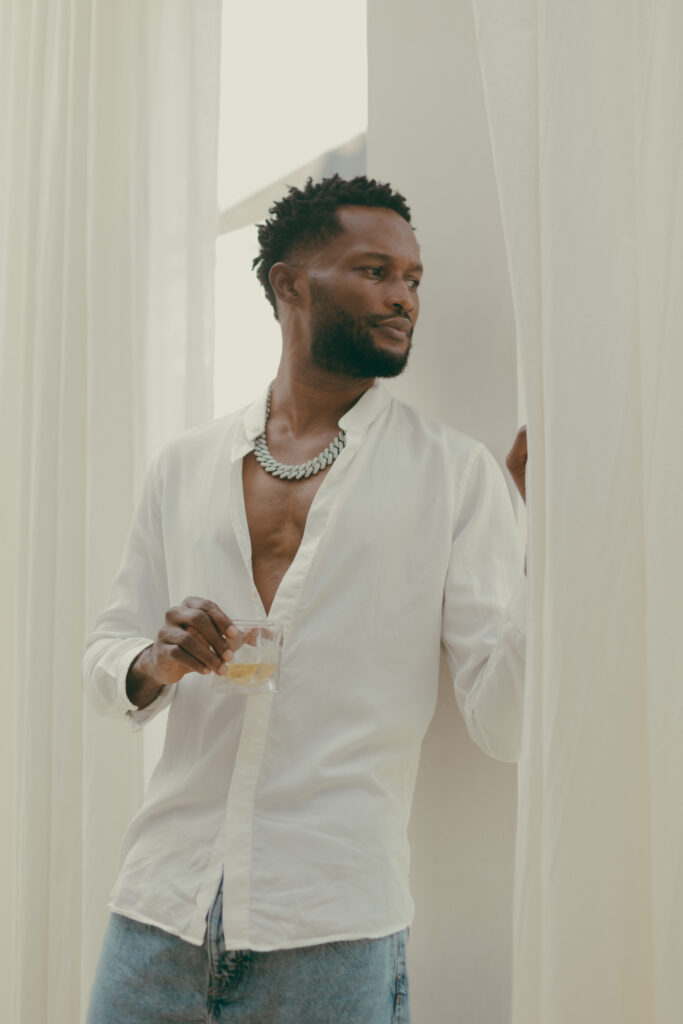
If you could give your younger self one piece of advice before stepping into the spotlight, what would it be?
I would say, don’t do drugs. Don’t get carried away by pressure. Own your craft. Don’t stop learning. The second you tell yourself that you know it all, you are done for. The second you feel like you have arrived, you are finished. But most importantly, hold God close. When I say hold God close, I mean suffocate Jesus Christ. That’s the only way. Or else you’ll lose yourself.
What does success mean to you personally, and has that definition changed as your career has grown?
Ten years back, success would mean having to do multiple jobs. But right now, it’s the smile on a fan’s face when they say, I love your work. I enjoyed the film. I enjoyed watching you in this film, in that film. It was believable. That, for me, is success. That, for me, is a job well done. And, of course, most importantly, the look on my woman’s face. The laughter of my mother when she watches me on the screen. The smile. The bold smile my sister has on her face when she’s watching me. I’m a bit of a family-oriented human being. I love family. Success for me is making sure that everybody around me is genuinely happy.
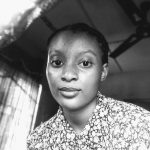
Dorcas Akintoye is a versatile writer with a passion for beauty, fashion, relationships, and culinary delight. With a keen eye for detail and a passion for storytelling, she adds a touch of elegance to every topic she explores. She is a writer at THEWILL DOWNTOWN.



